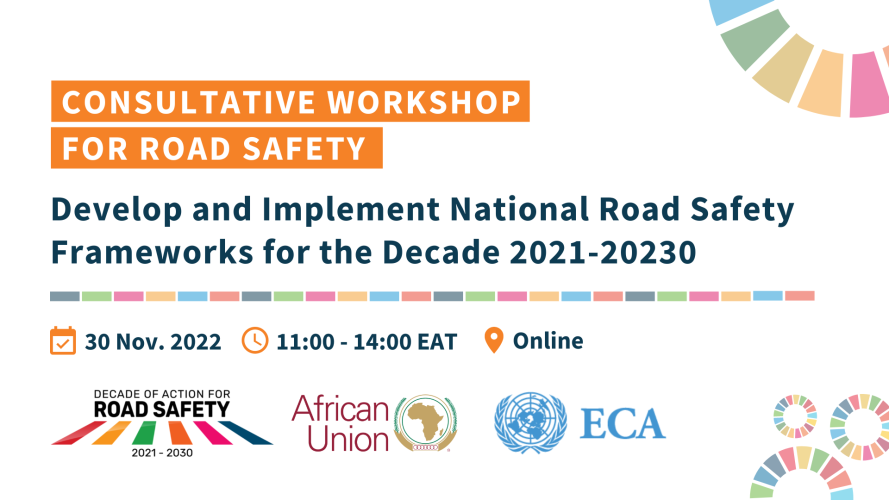iRAP partners are encouraged to attend the upcoming “Consultative Workshop for African Road Safety: Develop and Implement National Road Safety Frameworks for the Decade 2021-2030” to be hosted online on 30 November from 11:00 – 14:00 EAT (9:00 – 12:00 CET) by the United Nations Economic Commission for Africa (ECA) and the African Union Commission (AUC) in the context of the Decade of Action for Road Safety 2021-2030.
The main objective of the meeting is to create awareness around Africa’s post-2020 Strategic Directions for Road Safety and the African Road Safety Action Plan 2021-2030. These documents will support AU member States in developing or updating their national road safety strategies, taking into consideration national specificities and the recommendations of the Global Plan for the Decade of Action for Road Safety 2021-2030.
More specifically, the objectives of the meeting are to:
- Share best practices with AU member States to mainstream the Global and Continental Action Plans in their national frameworks.
- Define the fundamentals for improving road safety at the national level.
- Stimulate the debate on the way forward after the African Road Safety Charter enters into full force,
- Promote the African Road Safety Observatory (ARSO).
The programme will include presentations on iRAP partnerships helping to eliminate high-risk roads in Africa, including:
- Experience sharing: Gambia Road Safety Action Plan 2021-2030 – which includes 3-star or better targets for national highways
- Experience sharing: Morocco’s Road Safety Action Plan 2021-2030 – iRAP is working with the National Road Safety Agency (NARSA) and General Department of Roads (GDR) to shape a Memorandum of Understanding to work together to eliminate high-risk roads in Morocco. iRAP and Autoroutes du Maroc (ADM) have also recently signed a contract to assess 200kms of roads in Morocco, and train and accredit ADM personnel.
- The Ten Step Plan Tanzania and TanRAP Launch – A 30-month project designed to meet the specific needs of Tanzania and build sustainable institutional capacity, impact and partnerships – Jointly funded by the United Nations Road Safety Fund (UNRSF) and by the Foreign Commonwealth and Development Office (UKAid), through the Global Road Safety Facility (GRSF) of the World Bank, under the guidance of the United Nations Economic Commission for Africa (UNECA), the project is being implemented by a consortium led by the International Road Federation (IRF), and includes the International Road Assessment Programme (iRAP), the World Road Association (PIARC) and the Tanzania Roads Association (TARA). The project has brought together the Government of Tanzania through MoWT, TANROADS, TARURA, National Institute of Transport (NIT), and other leading institutions, NGOs and industry stakeholders in Tanzania.
- Experience sharing: Ethiopia Road Safety Strategy 2021-2030 – The 2022 Sustainability Journal recently published Road Safety Policy in Addis Ababa: A Vision Zero Perspective which recognised the city’s road safety status report based on an iRAP study of 114km of main roads in Addis Ababa. The investigation found that only 39% of roads were safe for vehicle occupants, and only 14% were safe for pedestrians.
iRAP in Africa and the Potential of 3-star or Better Roads
According to iRAP’s Safety Insights Explorer, it is estimated more than 700 lives are lost every day on African roads, 1,589 people acquire brain injuries, 194 suffer spinal injuries that can result in permanent disability and 21 people lose limbs in road crashes.
The World Bank, Africa Transport Policy Program (SSATP), World Health Organisation and African Road Safety Observatory Report “A Study of Road Safety Lead Agencies in Africa” published earlier this year included a recommendation for African countries to develop baseline measures for key risk factors such as iRAP safety Star Ratings.
iRAP and its partners in Africa have assessed nearly 49,500km of roads and designs and 178 schools on the continent, risk mapped 3,900km and influenced the safety of more than USD$2 billion of road infrastructure investment. Nearly 2,300 people have been trained at trainings and events held within African countries and 2,200 have joined virtual trainings and events. Fifty (50) practitioners are iRAP Accredited helping to ensure the delivery of iRAP specification services within African countries is to the global road infrastructure standard recognised in the UN Global Road Safety Performance Targets 3 and 4.
For a downloadable overview of iRAP partners’ work in Africa, see our Partner Success Stories from Around the World table here and search “Africa”.
To see Uganda’s National Road Safety Strategy and Action Plan for 2021-2026 which also includes 3-star or better targets set in line with UN Targets 3 and 4, click here.
Achieving UN Targets 3 and 4 by 2030 for more than 75% of travel to be on 3-star or better roads by 2030 in Africa stands to save over 101,400 lives and 22.3 million lives and serious injuries with an economic benefit of USD$520 billion to Africa’s economy – a $20 benefit for every $1 spent.
iRAP stands ready to support existing and new partners in Africa – governments, mobility clubs, funding institutions, industry and road safety NGOs – with the free iRAP methodology, tools, training and programme support to implement the Global Plan, African Road Safety Action Plan. and national strategies and action plans to save lives and prevent serious injuries on 3-star or better safer roads across the continent.
For iRAP support, please contact AfricaRAP Lead Racheal Nganwa on email racheal.nganwa@irap.org

















